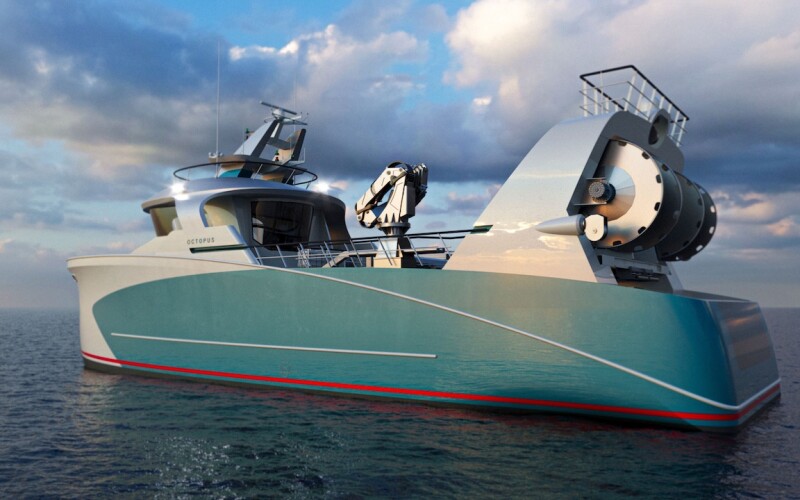Dutch shipyard Padmos has shared their first images of the multifunctional fishing vessel, the ‘Octopus’ project. Walter van Harberden, a naval architect and one of the directors of the shipyard, was the mastermind behind the project. The Octopus has been called more than a fishing vessel, and its diesel-electric-powered engines may be powered entirely by another energy source in the future.
Hook and Net Mag share that this is possible thanks to the ship’s modular structure. The boat will have a bare hull with removable containers for storing batteries or hydrogen. Construction of the first Octopus is said to begin in August 2024.
Jacob Brands, a Dutch fisherman, placed the first order for the Octopus boat. His last boat, the UK-161, was scrapped, and the first sank off the coast of France in 2020. Hook and Net shared that the amount Brands received for the scrapped vessel would not allow him to invest in new construction, so he began looking at other investors, particularly in the seafood processing sector.

The vessel will be versatile and will be used for more purposes than fishing. Van Harberden explained to Hook and Net, “When the fishing season is over, we can replace the containers for storing fish with containers for other types of equipment.”
The boat bow will be adapted to different fishing operations such as fly-shooting, twin rig trawl, and single trawl, similar to the eight legs of a real octopus. Van Harberden devised a system inside the boat to quickly move the containers.
“The containers will allow the fish to be chilled or frozen, and unloading the product will be less tiring thanks to the use of the crane,” shares Van Harberden.
Padmos Shipyard specializes in the construction of many types of fishing boats and the repair of fishing vessels and workboats. Leon Padmos, managing director of the shipyard, said, “It’s very futuristic. And it is a modular and tailor-made boat.”
Brands’ project will cost about $6.5 to 8.7 million for the nearly 100-foot vessel, depending on his chosen features.
“We want innovation. If possible, we always stay one step ahead,” shared Padmos.
Many questions remain about the acceptability of the project to government departments and bodies such as Bureau Veritas. Padmos comments,
“The discussion with the Dutch authorities is ongoing. It is known that the fishing industry is changing and the industry needs to find answers to concerns such as the lack of resources and the ecological transition. There is always fishing activity.”


